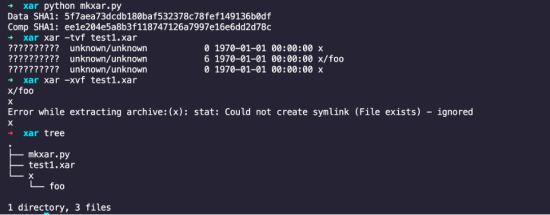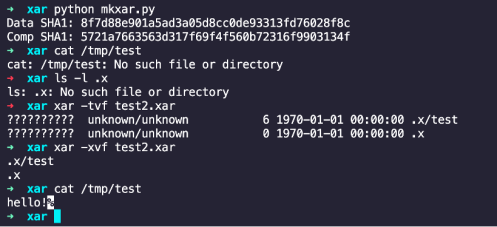Vendor: Apple
Vendor URL: https://www.apple.com/
Versions affected: xar 1.8-dev
Systems Affected: macOS versions below 12.0.1
Author: Richard Warren
Advisory URL: https://support.apple.com/en-gb/HT212869
CVE Identifier: CVE-2021-30833
Risk: 5.0 Medium CVSS:3.1/AV:L/AC:L/PR:L/UI:R/S:U/C:N/I:H/A:N Summary
XAR is a file archive format used in macOS, and is part of various file formats, including .xar, .pkg, .safariextz, and .xip files. XAR archives are extracted using the xar command-line utility. XAR was initially developed under open source, however, the original project appears to be no longer maintained. Apple maintains their own branch of XAR for macOS, which is published on the Apple Open Source website. The xar utility suffers from a logical vulnerability which allows files to be extracted outside of the intended destination folder, resulting in arbitrary file write anywhere on the filesystem (permissions allowing).
Impact
An attacker could construct a maliciously crafted .xar file, which when extracted by a user, would result in files being written to a location of the attacker’s choosing. This could be abused to gain Remote Code Execution.
Details
The XAR archive format supports archiving and extraction of symlinks for both files and directories. When extracting an archive which contains both a directory symlink and a file within a directory named the same as the directory symlink, xar will overwrite the directory symlink with a real directory. This protects against maliciously crafted archives where a symlink directory is unarchived and a file is unarchived into it. An example of the Table of Contents (ToC) for a .xar file in this scenario is shown below:
<?xml version="1.0" encoding="UTF-8"?>
0
20
/tmp/
symlink
x
directory
x
6
20
6
aaf4c61ddcc5e8a2dabede0f3b482cd9aea9434d
aaf4c61ddcc5e8a2dabede0f3b482cd9aea9434d
file
foo
As shown below, this results in the directory “x” being created in the current directory, and the file foo being written within it, rather than to the /tmp/ directory – which was the target of the directory symlink:

However, xar allows for a forward-slash separated path to be specified in the file name property, e.g. .xar file which contains both a directory symlink, and a file with a name property which points into the extracted symlink directory. By abusing symlink directories in this manner, an attacker can write arbitrary files to any directory on the filesystem – providing the user has permissions to write to it. An example of the ToC for a malicious .xar file which exploits this vulnerability is shown below:
<?xml version="1.0" encoding="UTF-8"?>
0
20
/tmp/
symlink
.x
6
20
6
aaf4c61ddcc5e8a2dabede0f3b482cd9aea9434d
aaf4c61ddcc5e8a2dabede0f3b482cd9aea9434d
file
.x/test
The following screenshot shows successful exploitation of this vulnerability to write a file into the /tmp/ directory using a directory symlink:

Recommendation
Update to macOS 12.0.1 or above.
Vendor Communication
2021-06-04 – Reported to Apple Product Security.
2021-06-08 - Apple advise they are investigating the report and require more than 30 days.
2021-06-24 - Apple confirm they are able to reproduce the vulnerability and are working to address in a future major macOS update.
2021-08-17 - We request an estimated date for a fix from Apple.
2021-08-19 - Apple advise they are still working on addressing the issue. Request that we hold off any disclosure.
2021-10-25 - macOS 12.0.1 released, which addresses the reported vulnerability.
2021-10-28 - Advisory published.About NCC Group
NCC Group is a global expert in cybersecurity and risk mitigation, working with businesses to protect their brand, value and reputation against the ever-evolving threat landscape. With our knowledge, experience and global footprint, we are best placed to help businesses identify, assess, mitigate respond to the risks they face. We are passionate about making the Internet safer and revolutionizing the way in which organizations think about cybersecurity.
Published Date: 2021-10-28
Written By: Richard Warren
